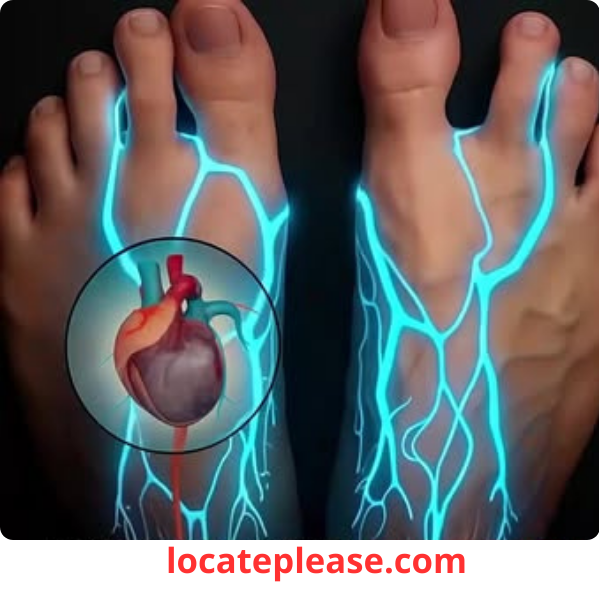Heart disease remains the leading cause of death in the United States — claiming over 600,000 lives each year.
And while heart attacks often seem sudden, your body rarely gives no warning.
In fact, **up to 80% of heart attacks are preceded by subtle — but significant — symptoms that can appear weeks in advance, sometimes as early as one month before the event.
The problem?
Most people dismiss these signs as stress, aging, or fatigue — not realizing they’re red flags from their heart.
By learning to recognize these early warnings, you could save your own life — or someone else’s.
Here are the 7 key signs your body may send in the weeks before a heart attack — and why you should never ignore them.
🚩 1. Swollen Feet and Ankles (Edema)
One of the earliest signs of heart failure is fluid retention in the lower body.
When the heart’s lower chambers (ventricles) weaken and can’t pump blood efficiently, blood backs up in the veins. This causes fluid to leak into surrounding tissues — leading to swelling in the feet, ankles, and legs.
✅ What to watch for:
- Puffiness that worsens by the end of the day
- Shoes that feel suddenly tight
- Indentations left on the skin after removing socks
👉 This isn’t just “water weight” — it’s your heart struggling to keep up.
🌬️ 2. Shortness of Breath (Even at Rest)
If you’ve been catching your breath after climbing stairs — or even while sitting down — it could be a sign your heart isn’t delivering enough oxygen-rich blood to your lungs.
As arteries narrow or the heart weakens, pulmonary congestion can develop — fluid builds up in the lungs, making it harder to breathe.
✅ Red flags:
- Breathlessness during light activity or at rest
- Waking up gasping at night
- Needing extra pillows to sleep comfortably
This symptom often appears weeks before a heart attack, especially in women.
😩 3. Unexplained Fatigue
Feeling exhausted — not from a long day, but from just existing?
When your heart isn’t pumping efficiently, every organ and muscle gets less oxygen. This forces your body to work harder, leading to persistent, unrelenting fatigue.
✅ Key signs:
- Feeling drained after minimal activity
- Difficulty completing daily tasks (like showering or cooking)
- Constant drowsiness, even after a full night’s sleep
Women, in particular, report extreme fatigue as a top early warning sign — often weeks before a cardiac event.
💪 4. Sudden Weakness or Dizziness
When blood flow is restricted due to narrowed arteries, your muscles and brain don’t get the fuel they need.
This can cause:
- Sudden muscle weakness
- Lightheadedness or dizziness
- Near-fainting or actual fainting spells
✅ Why it’s dangerous:
Weakness can lead to falls — and if your heart is already struggling, a sudden drop in blood pressure can trigger a cardiac event.
💤 5. Trouble Sleeping (Especially Lying Flat)
If you find yourself propping up with pillows or waking up gasping, it could be a sign of fluid buildup in the lungs — a condition known as orthopnea.
When you lie flat, blood that’s pooling in your lower body returns to your heart and lungs — overwhelming a weakened system.
✅ Symptoms:
- Waking up breathless
- Needing to sleep upright
- Frequent nighttime urination (as the body tries to eliminate excess fluid)
This is not normal aging — it’s a warning sign of heart strain.
🧠 6. Brain Fog and Mental Confusion
Your brain needs a steady supply of oxygen-rich blood to function.
When the heart falters, cognitive symptoms can appear:
- Difficulty concentrating
- Memory lapses
- Confusion or disorientation
This happens because reduced cardiac output affects blood flow to the brain — a silent but serious sign of heart dysfunction.
💔 7. Chest Discomfort or Pressure (Often Ignored)
While classic chest pain is common during a heart attack, early warning signs can be more subtle:
- A dull ache or pressure in the chest
- Tightness that comes and goes
- Discomfort that radiates to the arm, neck, or jaw
Many people dismiss it as indigestion or stress — but persistent chest discomfort weeks before an attack is a major red flag.
🔍 Why These Signs Appear Weeks in Advance
Before a heart attack, the heart doesn’t just “stop” — it struggles.
- Plaque buildup in arteries slowly restricts blood flow
- The heart muscle works harder to compensate
- Oxygen delivery to organs declines gradually
This slow decline creates early symptoms — your body’s way of saying:
“I can’t keep up anymore.”
And while not everyone experiences all symptoms, knowing them could be lifesaving.
🛑 Who’s at Higher Risk?
Certain factors increase your chances of a heart attack:
- High blood pressure or cholesterol
- Diabetes
- Smoking
- Obesity
- Family history of heart disease
- Chronic stress or poor sleep
- Sedentary lifestyle
If you have any of these, pay extra attention to your body’s signals.
✅ What You Should Do If You Notice These Signs
- Don’t wait.
These are not “maybe” symptoms — they’re urgent warnings. - See your doctor immediately.
Request:- Blood pressure and cholesterol tests
- ECG (electrocardiogram)
- Echocardiogram (heart ultrasound)
- Blood tests (like troponin, which detects heart damage)
- Keep a symptom journal.
Note when symptoms occur, how long they last, and what you were doing. - Act now — not later.
Early intervention can prevent a heart attack entirely.
💡 Prevention: Protect Your Heart Every Day
- Exercise regularly — even 30 minutes of walking daily helps
- Eat a heart-healthy diet — rich in vegetables, whole grains, and healthy fats
- Manage stress — through meditation, yoga, or therapy
- Quit smoking — one of the best things you can do for your heart
- Monitor blood pressure and blood sugar — know your numbers
❤️ Final Thoughts: Your Heart Is Speaking — Are You Listening?
A heart attack doesn’t have to be sudden.
Often, your body screams for help weeks in advance — through fatigue, swelling, breathlessness, and weakness.
The difference between life and death may not be luck —
👉 It may be awareness.
So if you or a loved one experience any of these symptoms, don’t brush them off.
Listen to your body.
Respect the warning signs.
Get help early.
Because the best time to prevent a heart attack is before it happens.
Your heart works 24/7 for you. It’s time to return the favor.










